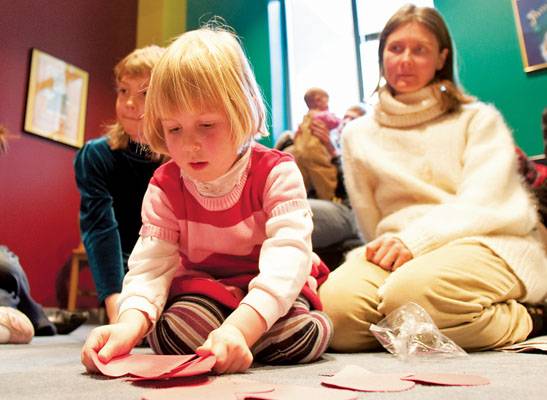Preserving culture

Katya Lavrova, puts together a small heart puzzle along with her sister Paulina Lavrova during a weekly meeting in the Ames Public Library held every Saturday, in order to teach Russian to kids who are too young for school. Photo: Manfred Strait/Iowa State Daily
January 28, 2009
A group of three girls, all about four years old, scurries into a cozy room at the Ames Public Library decorated with bold primary-colored walls and adorned with pictures of scenes from favorite children’s books.
“The beginning is always rushed,” Lesya Hassall said with an evident Ukrainian accent as she dashed into the room after the three girls.
Hassall, an instructional development specialist at Iowa State, tosses an armful of thick pastel winter coats onto a chair in the corner of the room while the girls mingle and tell stories to one another with hand puppets. Other children wander into the room, their parents in tow.
Once everything is settled, Hassall informs the children that class has begun, this time not in English, but in Russian.
The girls drop puppets with yellow yarn for hair and join hands in a circle with Hassall, the other children and their parents, and they all begin singing.
“Mi-shi vo-djat ho-ro-vod, Na le-zhan-ke le-zhit kot,” the children and their parents sing while holding hands and walking slowly in a circle. Roughly translated, this poem means “mice are walking in a circle, the cat is sleeping on a couch.”
Thus begins the weekly meeting of the Ames Russian Toddler Club, a group organized by Hassall specifically for children who come from Russian-speaking families. The group consists of about eight children who range in age from three to five years old.
Hassall found other Russian-speaking families by sending e-mail to members of Iowa State’s Russian Speaking Student Association, and members with children expressed interest in her idea.
Hassall decided to start the organization two years ago when she noticed her daughter, Sasha, 4, was successfully learning English, but not making as much progress with the Russian language. English, Hassall said, is the working language of her family, as her husband is American. However, she wanted Sasha to feel connected to her Ukrainian heritage and to “use the language as a tool and talk to people with different backgrounds.”
Most members of the organization have backgrounds similar to Hassall’s and encourage their children to speak Russian to preserve their culture and language.
Hassall said she wants to encourage her daughter to speak another language because it will benefit her academically.
“A lot of research is indicating that bilingualism has the cognitive benefits that many monolinguals don’t understand,” said Katherine Bruna, assistant professor of curriculum and instruction who has researched multilingualism in schools.
“When you are bilingual, you orient fundamentally differently to the world because you understand that there are multiple representations of things,” Bruna said.
Many of the children in the Ames Russian Toddler Club have two Russian-speaking parents and learned Russian as their first language. However, they have picked up English by interacting with English-speaking kids and watching American television.
The bilingual children in the club “switch pretty easily” between Russian and English, Hassall said.
“I’m amazed by the power of their minds.”
Research shows children learn language differently than adults, Bruna said.
“They’re just absorbing what’s in their environment,” she said, explaining why children easily learn a second language. “They’re young, their brains are still developing.”
In addition, children are more likely to attain pronunciation akin to that of native speakers of a language because they are still learning a pronunciation system of their primary language.
Exactly why children are better at learning language is still up for debate among scholars.
Hassall and the other members of the Ames Russian Toddler Club want their children to maintain the language, and believe the club is an effective means to achieve this goal. Bruna said she agrees with Hassall in that encouragement from parents will help a child maintain the language.
“Social context is also really important,” Bruna said. “Kids pick up social messages about the values that language have in society and they will undoubtedly grow up with a clear understanding that English is the dominant language.”
Hassall said most of the parents in the club encourage their children to speak Russian, but when the kids are playing with their friends, they will use English since they’ve realized it is the dominant language in society.
When meeting at the Ames Russian Toddler Club, the children are so engaged with learning Russian that it is evident the parents and children will maintain the language and attempt to keep alive an important part of their heritage.
Holidays
At the Ames Russian Toddler Club, children practice learning the Russian language and also learn about traditions and holidays of their heritage.
Russian New Year – Jan. 1: Ded Moroz — Father Frost — visits children with his fairy granddaughter Snegurochka — Snow Maiden — to bring them gifts. The celebration begins at 11 p.m. and is celebrated similarly to the American New Year’s celebration.
Old New Year – Jan. 13 to 14: Celebrated in Russia, Ukraine, Georgia and Belarus, this holiday originated after the switch from the Julian calendar to the current Gregorian calendar. Russian-speaking countries still observe and celebrate the original date of the New Year.
Valentine’s Day – Feb. 14: Traditionally, Russian Orthodox churches do not recognize Valentine’s Day, but recently Russian children have started observing this tradition the same way Americans do.
National Women’s Day – Mar. 8: This holiday is similar to Mother’s Day in America. Men will give small gifts to their wives, daughters, sisters and friends to recognize their hard work.






